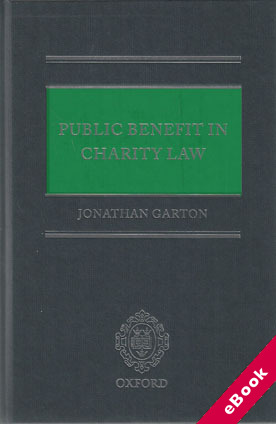
The device(s) you use to access the eBook content must be authorized with an Adobe ID before you download the product otherwise it will fail to register correctly.
For further information see https://www.wildy.com/ebook-formats
Once the order is confirmed an automated e-mail will be sent to you to allow you to download the eBook.
All eBooks are supplied firm sale and cannot be returned. If you believe there is a fault with your eBook then contact us on ebooks@wildy.com and we will help in resolving the issue. This does not affect your statutory rights.
Public Benefit in Charity Law: Principles and Practices examines the legal principles and practical applications of the public benefit test in charity law in the UK, Australia, Canada, and New Zealand.
In order to obtain charitable status, an organization must not only have exclusively charitable purpose but also demonstrate that it provides a benefit to the public. There is a considerable body of shared case law on public benefit in these jurisdictions and yet to date there has been no comprehensive study of the topic.
It is highly topical, given the many statutory reforms to public benefit in Australia, England, and Scotland, as well as the legislative reforms in Northern Ireland. In England, for instance, the Charities Act 2006 removed the presumption that some charitable purposes automatically provide a public benefit, and for the first time all charities are required to demonstrate that they satisfy the common law public benefit requirements.
The impact of the reforms on independent schools and health care charities, which risk losing their charitable status if they are seen as only benefiting private individuals, attracted considerable political and media attention. The book sets out a critical analysis of the general principles of public benefit that have developed since the emergence of the doctrine in England in the nineteenth century, and its export to the other jurisdictions.
These principles are evaluated in the light of the traditional justifications for the public benefit requirement. The book also considers the practical implications of these principles in relation to specific areas of charitable activity in each jurisdictions. The analysis includes issues affecting education, health care provision, religious charities, human rights charities, political campaigning, and environmental action.
Reference to other jurisdictions including the Republic of Ireland and the USA is made where such comparison is helpful.